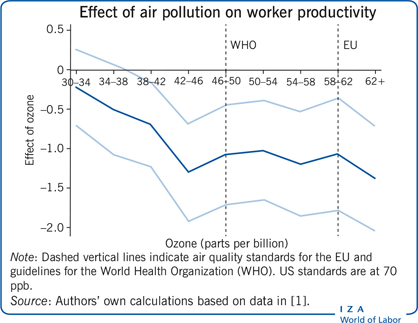Elevator pitch
Environmental regulations are typically considered to be a drag on the economy. However, improved environmental quality may actually enhance productivity by creating a healthier workforce. Evidence suggests that improvements in air quality lead to improvements in worker productivity at the micro level across a range of sectors, including agriculture, manufacturing, and the service sectors, as well as at more aggregate macro levels. These effects also arise at levels of air quality that are below pollution thresholds in countries with the highest levels of environmental regulation. The findings suggest a new approach for understanding the consequences of environmental regulations.

Key findings
Pros
Working in a cleaner air environment facilitates higher levels of productivity.
Poor air quality does not affect a worker’s decision to work or the number of hours worked, at least on a daily basis, for the levels of pollution found in nations with the highest levels of environmental regulation.
Tightening of air quality standards would likely lead to continued improvements in worker productivity.
Cons
Poor environmental quality reduces worker wages in settings where pay is based on performance.
Worker productivity captures more subtle effects of pollution, which are likely to be widespread.
Reduced worker productivity occurs at levels of pollution well within current air quality standards and guidelines.
At higher levels of pollution, poor air quality affects not only worker output but also labor supply.